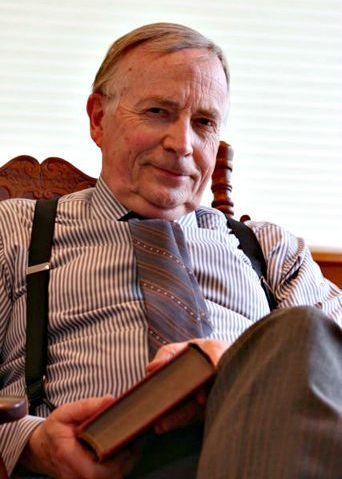Professor of German finds a second home onstage
In a way, Richard Figge owes both of his careers to the liberal arts.
First, there is the teaching and the scholarship. Figge is the Gingrich Professor of German Emeritus at the College of Wooster, where he has taught German language, literature and theater for years.
But there also is Richard Figge, actor, who spent his off hours on the Freedlander Theater stage.
Never in 30 years, Figge said, did anyone say, What right does a German professor have doing theater?
He did quite a bit of it and continues to do so at theaters in the region and around the country. On Wednesday, May 21, Figge will bring the one-man David Rintels drama Clarence Darrow to the stage at Music on Market, held in the sanctuary of the Wooster United Methodist Church, 243 N. Market St. The performance, which begins at 7 p.m., is free, though a free-will offering will be taken.
A veteran performer, Figge got an early start. I wrote, produced, directed and starred in my own play at the age of 10, he said, when I was in fifth grade. He continued acting through high school and college, did one play while in graduate school and found a theater home at Wooster, where he did 13 shows directed by the late Annetta Gomez-Jefferson. I got killed off in a surprising number of them, he said.
At one point, he and Jefferson discussed the possibility of Figge doing a one-man show. The subject: Edgar Allan Poe.
Figge left for a sabbatical in Germany. He toyed with the Poe show until he read Rintelss Darrow script.
Poe was to be nevermore.
I was electrified, Figge said. I said, Poes on the back burner. This is the one I want to do.
He first performed the play in the early 1980s at the college and was encouraged by his wife, Susan, to take it on the road. One hundred and fifty performances later, Figge said, playing Darrow never gets old. The audiences are new, he said, so its new to me.
He performed in Washington, D.C. as part of a benefit for the Broadcast Pioneers Library, under the patronage of President Ronald Reagan, as well as for bar associations and audiences across the U.S. and Europe. There was a break, he said, when actor Leslie Nielsen bought the rights to the play and performed it himself. Once Nielsen had ceased his performances, Figge started calling the publisher, who eventually contacted Nielsen about letting Figge perform it again. The publisher told Figge, Leslie Nielsen called up this morning and said, Let him do it.
Hes gotten to know Darrow pretty well. One of Americas most celebrated lawyers, Darrow defended union leader Eugene Debs, was the defense attorney in the Leopold and Loeb murder trial and faced off against William Jennings Bryan in the Scopes Monkey Trial. Figge, whose own father was also an attorney, has spoken with a number of people who knew Darrow, including Blanche Darrow Chase, his granddaughter. He also met Irving Stone, author of Clarence Darrow for the Defense, the book on which Rintelss play is based.
For Figge, playing a lawyer is preferable to being one. He considered law school at one point, he said, but not too seriously. My idols were teachers and writers and actors.
His career as an actor has seen him performing not only as Darrow, but as actor John Barrymore in Barrymores Ghost, and in casts at Coach House Theater, Weathervane Playhouse and the Ohio Shakespeare Festival. Hes also done film, most notably appearing as a prison chaplain in The Shawshank Redemption.
Darrow is his wifes favorite, Figge said. My wife can tell when Im thinking about Darrow, he said. I walk differently.
And while Figge holds Darrow close, he admits his favorite role might be quite different. Maybe, he said, Cyrano de Bergerac, a role he performed in a Jefferson-directed production in the 1970s. It is the most lovely play, he said. It has tenderness. It has bravado. It took a tremendous amount of energy. I was wolfing candy bars backstage and I still lost 10 pounds.
In Darrow, Figge promises there is something to wound and delight everybody. ...Its a celebration.

